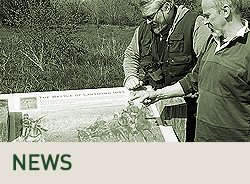Background
After the death of his son, Henry I intended that his daughter Matilda succeed him. But the idea of a woman ruling in England and Normandy did not gain the support of all the nobility. Following Henry’s death in 1135, his nephew Stephen of Blois, who held extensive estates in south east England as well as Normandy, travelled from the continent to seize the crown. As Matilda attempted to recover the throne England began to descend into Civil War.
King David I of Scotland, a relation of Matilda, was one of those who rallied to her supported and, throughout the conflict, was one of her most consistent supporters. However he also had other objectives. In 1066 the territory of Carlisle was part of Strathclyde, but it had been taken in to England by 1100 and here David had claims via his brother Edgar and Siward his wife’s grandfather. He also had claims in England to the Earldoms of Northumberland and Huntingdonshire, through his wife’s father Waltheof.
Over a period of three years the Scots made a number of separate incursions into the north of England, but these were not simply the raids to destroy and plunder that typified later Scottish invasions. David’s intention as conquest of the northern counties. Norman control of the north was being achieved by the construction of castles across the Marches and capture of these castles was thus critical to the seizure of territory. But over the centuries, when necessary, the Scottish forces could and did bypass these strongholds for an attack deep into England.
In 1136 King David invaded, taking the towns and castles of Carlisle, Wark, Alnwick, Norham and Newcastle. Stephen marched north with an army to meet the threat but this campaign ended in a negotiated settlement rather than a battle. It was a settlement in which Stephen ceded Cumbria to David. This encouraged him to further action, taking it as a sign of weakness on Stephen’s part. He invaded again in 1137 and then again in early 1138. This time Stephen responded with a punitive strike into the Lowlands of Scotland. But in the 12th century armies could not be kept in the field indefinitely and soon he had to withdraw.





